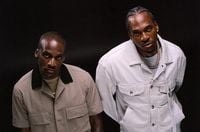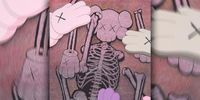After a long wait of nearly 16 years, the iconic Virginia Beach rap duo Clipse—comprising brothers Gene "Malice" Thornton and Terrence "Pusha T" Thornton—have made a triumphant return with their fourth studio album, Let God Sort Em Out. Dropping on July 11, 2025, this 13-track record marks their first project since 2009's Til The Casket Drops and is a powerful testament to their enduring influence and evolution in hip-hop.
Produced entirely by Pharrell Williams, who has been a guiding force behind Clipse’s sound since their early days, the album was recorded at the Louis Vuitton headquarters in Paris, where Pharrell also serves as the creative director of menswear. This collaboration marks a departure from Pharrell’s previous work with Chad Hugo as part of The Neptunes, now seeing Williams helm production solo. The result is a sonically rich and unpredictable landscape, ranging from dissonant and eccentric beats on tracks like "Inglorious Bastards" to all-consuming soundscapes in the album’s title track.
Let God Sort Em Out is more than just a return; it’s a deeply personal and reflective journey. The opening track, "The Birds Don’t Sing," featuring John Legend and the gospel choir Voices of Fire, confronts the brothers' profound grief over the near-simultaneous deaths of their parents. Pusha T’s raw verse captures his struggle after losing his mother in late 2021: "Lost in emotion, Mama’s youngest/ Tryna navigate life without my compass... Some experience death and feel numbness/ But not me, I felt it all and couldn’t function." Malice follows with his own poignant recollection of their father’s passing months later, delivering lines that linger: "Your car was in the driveway, I knew you were home/ By the third knock, a chill ran through my bones/ The way you missed Mama, I guess I should have known/ Chivalry ain’t dead, you ain’t let her go alone." This emotional depth is a fresh territory for Clipse, who have historically been known for their vivid street narratives and technical prowess.
The album deftly balances this vulnerability with the duo’s signature sharp lyricism and streetwise bravado. Tracks like "Chains & Whips," featuring Kendrick Lamar, showcase Pusha T’s biting critique of the rap game’s superficiality. His verse, confirmed to target Harlem rapper Jim Jones, cuts deep: "You’d think it’d be valor amongst veterans... I’m watching your fame escape relevance." Lamar’s fierce contribution was a point of contention with Def Jam and Universal Music Group, who reportedly tried to alter or remove his verse due to lingering tensions from Lamar’s past beef with Drake, another Universal artist. This corporate interference led Pusha T to pay a seven-figure sum to buy out both his and Clipse’s contracts with Def Jam, allowing the album to be released through JAY-Z’s Roc Nation instead, preserving the integrity of their work.
Aside from Lamar, the album features a diverse array of guests who complement Clipse’s dynamic. Tyler, the Creator appears on "P.O.V.," though Clipse’s commanding presence overshadows his contributions. Other collaborators include Stove God Cooks on "F.I.C.O.," Ab-Liva on "Inglorious Bastards" and the title track’s second part, Nas on "Let God Sort Em Out/Chandeliers," The-Dream on "All Things Considered," and John Legend’s soulful presence at the start of the album. Pharrell himself steps up vocally on several tracks, showcasing his multifaceted role beyond production.
The album also doesn’t shy away from contemporary rap scene drama. On "So Be It Pt II," Pusha T takes aim at Travis Scott with unflinching directness, continuing his tradition of addressing rivals head-on. This approach echoes Clipse’s early career, when they built their reputation as unapologetic storytellers and underdogs battling industry politics. Back in the mid-2000s, after their debut Lord Willin’, Clipse found themselves mired in label disputes, prompting the formation of the Re-Up Gang with Ab-Liva and Sandman and the release of the We Got It 4 Cheap mixtape series. Their 2006 album Hell Hath No Fury cemented their status as one of the era’s defining rap duos, known for their intricate coke rap narratives and sharp lyricism.
Malice’s journey has been particularly transformative. In the early 2010s, he changed his stage name to No Malice and shifted focus to non-secular rap following a crisis of faith and purpose. His spiritual evolution adds a layer of reflection to the album’s themes, as he raps about walking away and finding freedom through faith. Yet, on Let God Sort Em Out, the brothers blend these spiritual elements with the gritty realities of their upbringing and careers, refusing to be confined to a single narrative.
Pharrell’s production plays a crucial role in framing this duality. His beats range from minimalistic and eerie to complex and layered, underscoring the album’s emotional and thematic shifts. The track "E.B.I.T.D.A." features an obstinate rhythm that never quite settles, driving the song forward with relentless energy. "Inglorious Bastards" warps horn riffs into daring atonality, while "So Far Ahead" juxtaposes gospel samples with low-budget synth buzz, creating a thrilling sonic tension.
Despite the album’s occasional flirtation with more commercial sounds—such as the John Legend-led chorus on the opener—the lyrical content remains uncompromising and potent. The record is a reminder of Clipse’s unique place in hip-hop, where storytelling craftsmanship and raw honesty coexist. Their return feels both nostalgic and utterly fresh, proving that their artistry has not only endured but evolved alongside the genre.
The journey to release was fraught with challenges, but Clipse emerged stronger, reaffirming their revolutionary stance in rap. As Malice succinctly put it, "We’re not into existing in rap, it has to be revolutionary." Pusha T echoes this sentiment with his relentless confidence: "You rappers all beneath me," and "All of you imposters, simply just Ferrari window shoppers." Their chemistry—Pusha T’s relentless intensity paired with Malice’s measured reflection—remains a defining feature that fans and critics alike have long admired.
In a hip-hop landscape often dominated by vibe and mood over lyricism, Clipse’s return is a refreshing reminder of the power of words and storytelling. Their vivid accounts, technical brilliance, and willingness to confront personal and industry struggles head-on make Let God Sort Em Out one of the most compelling albums of 2025. It’s a record that not only honors their legacy but also stakes a claim for their relevance and impact in today’s rap world.






